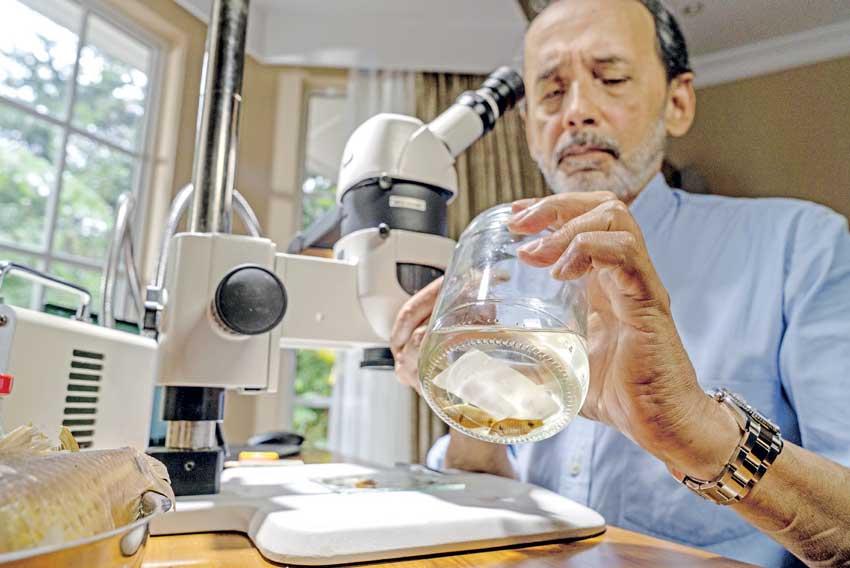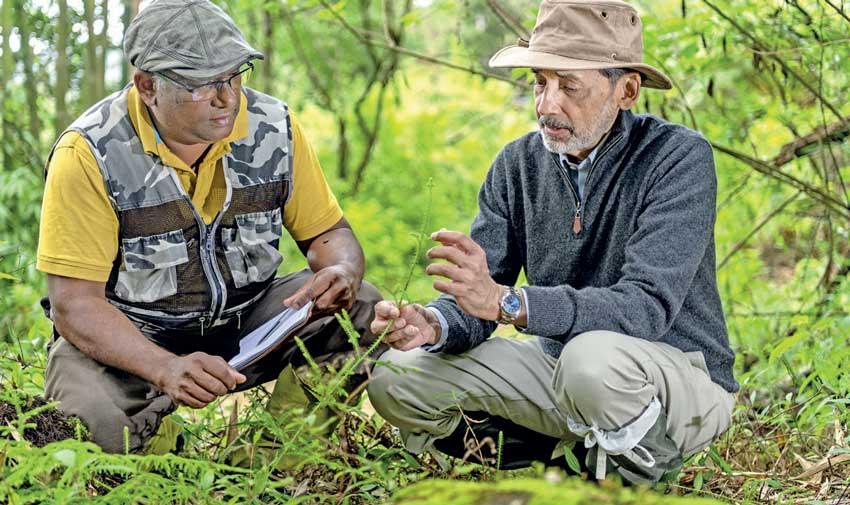Reply To:
Name - Reply Comment

Dr. Pethiyagoda examining a fish for taxonomic research
The Linnean Medal is more for lifetime achievement
I think that laws and regulations do very little to protect biodiversity
When it comes to conservation, the empowerment of citizens is far more useful than draconian laws
Fences need to be around farms, locking elephants out rather than locking them in
You have to be utterly ignorant to refer to the past 74 years as a curse
But so-called scientific biotheft has been increasing in recent years, where foreigners come to Sri Lanka and steal specimens for research
There is no point in protesting against development projects unless environmentalists also propose realistic alternatives
 At a time when Sri Lanka’s biodiversity has been challenged by various anthropogenic factors, environmentalists continue to work in their element, doing their best to conserve the environment. Having focused extensively on taxonomy, evolution and biogeography, leading naturalist Dr. Rohan Pethiyagoda was recently conferred with the coveted Linnean Medal for Zoology. The Medal is awarded to scientists for their contribution to the natural sciences, by the Linnean Society, London. In a candid interview with the Daily Mirror Dr. Pethiyagoda spoke about how empowering citizens could help protect the environment, impacts of shortsighted decisions, matters relating to biopiracy and how environmentalists could contribute to resolve the impending food crisis.
At a time when Sri Lanka’s biodiversity has been challenged by various anthropogenic factors, environmentalists continue to work in their element, doing their best to conserve the environment. Having focused extensively on taxonomy, evolution and biogeography, leading naturalist Dr. Rohan Pethiyagoda was recently conferred with the coveted Linnean Medal for Zoology. The Medal is awarded to scientists for their contribution to the natural sciences, by the Linnean Society, London. In a candid interview with the Daily Mirror Dr. Pethiyagoda spoke about how empowering citizens could help protect the environment, impacts of shortsighted decisions, matters relating to biopiracy and how environmentalists could contribute to resolve the impending food crisis.
All our indigenous fishes inhabit rivers. These rivers traverse extensive landscapes; very little of which are protected by law. But when local people know about a threatened species in their neighborhood, they take a special interest in protecting it
Sri Lanka’s high population density means there is a shortage of land, so people will encroach into forests to eke out a living from cash-crop cultivation. The answer to that problem is not stricter laws, but economic advancement, where people are able to find employment in more profitable enterprises
Excerpts:
Q Congratulations on winning the 2022 Linnean Medal for Zoology. How do you feel about winning this coveted medal which is said to be an equivalent to the Nobel Prize for naturalists?
Well, I’m uncomfortable about references I have seen relating the Linnean Medal to the Nobel Prize. They are not really comparable. The Nobel is awarded for making hugely consequential discoveries in science. The Linnean Medal is more for lifetime achievement. That said, I feel very grateful for this honour, especially considering the world-renowned scientists who have won the Medal before me, such as Ernst Haeckel, Albert Günther and Stephen Jay Gould. This is very humbling.
Q You have researched extensively on freshwater fishes in Sri Lanka. What are the most concerning anthropogenic threats affecting their populations at present?
Well, we used to say that deforestation, pollution and alien species are the biggest threats, but we have very little evidence one way or the other. We do not know of any recent freshwater fish extinctions in Sri Lanka, but certainly, species that are dependent on rainforest habitats are dwindling because of the loss of forest in the island’s southwest.
Q How important are freshwater fish in maintaining the equilibrium of a riverine ecosystem?
Again, this is something we know very little about. My focus has been largely on taxonomy, evolution and biogeography, but ecological studies of freshwater fishes and their interaction with the ecosystem are almost absent from Sri Lanka’s scientific literature. This is something that needs more research.
Q Are provisions included in the Fisheries and Aquatic Resources Act sufficient to protect freshwater fish species? If not what are some important provisions that need to be included?
I think that laws and regulations do very little to protect biodiversity. People’s attitudes, especially the attitudes of local people, are much more important. All our indigenous fishes inhabit rivers. These rivers traverse extensive landscapes; very little of which are protected by law. But when local people know about a threatened species in their neighborhood, they take a special interest in protecting it. The work done by the people in the village of Galapitamada to protect the Bandula Barb, a beautiful little fish that is found nowhere else in the world, and which I was instrumental in describing in 1991, is a fine example of people’s participation in conservation. When it comes to conservation, the empowerment of citizens is far more useful than draconian laws. But I know I am in a minority here!
Q Sri Lanka’s environment has been going through a rough patch with shortsighted decisions taken by those in power. Haphazard deforestation, poaching, decisions such as elephant trenches have proven to be ineffective. What are your observations and how could policy level decisions with regards to wildlife be made more effective?
Biodiversity conservation is a complex science. Only rarely do you find neat solutions. The main cause for deforestation is poverty. Sri Lanka’s high population density means there is a shortage of land, so people will encroach into forests to eke out a living from cash-crop cultivation. The answer to that problem is not stricter laws, but economic advancement, where people are able to find employment in more profitable enterprises. After all, we are not educating our children to be peasants. That is not what young people aspire to. They want better paying and more secure jobs. But with the present economic crisis, which will last for many years, we are going to see more poverty and more encroachment. I doubt if that can be prevented.
As for the human-elephant conflict a problem exists because there is so little habitat now remaining for elephants. So, they raid farms. In the past, we have spent hundreds of millions of rupees installing electric fences around elephant habitats. Scientists like Dr Prithiviriaj Fernando have shown that this is a waste of money. Fences need to be around farms, locking elephants out rather than locking them in. As for trenches, this doesn’t work, either. They are expensive and easily destroyed by heavy rainfall. Sadly, all this means that the human-elephant conflict will continue for years to come, leading to hundreds of deaths of both farmers and elephants. It is inevitable.

Dr. Pethiyagoda (right) with Sudath Nanayakkara, who manages the Agrapatana Montane Forest Restoration Project, which won a Rolex Award for Enterprise in 2000
Q The ongoing people’s protests at the Galle Face Green have given a space for people from various walks of life to voice for change. What are your thoughts about the ‘aragalaya’ (agitation)?
I have publicly supported the aragalaya in calling for President Rajapaksa to resign. He must go, and go now. But by refusing to subscribe to a unified set of ‘demands’, I think the aragalaya shot itself in the foot. I read with dismay the 20 demands they issued, which did not even mention the executive presidency, for example. Then there were some protesters who demanded that all 225 MPs had to go. Others talked about a 74-year curse. I find that particularly offensive because by 2019, we were the most prosperous nation in South Asia, generally compared with Eastern European countries. Is that a curse? The fact that we had had 30 disastrous months under the Pohottuwa Government might be a curse, but you have to be utterly ignorant to refer to the past 74 years as a curse.
Q Let’s talk about biopiracy. Does Sri Lanka have adequate laws to protect itself from biopiracy and biotheft?
Yes, I think our laws in this respect are pretty good. The arrest in 2020 of three Russian ‘scientists’, with 529 illegally collected specimens in their possession, is a good example. Having spent a period in remand, they were let out on bail and spent two years awaiting trial. Eventually, they pleaded guilty to the charges and were fined the equivalent of $42,000. They only narrowly avoided a 20-year prison term. So yes, the laws are good, and the Department of Wildlife Conservation does an excellent job in enforcing these laws.
But so-called scientific biotheft has been increasing in recent years, where foreigners come to Sri Lanka and steal specimens for research. I found 15 taxonomic papers published since 2018 which were based primarily on specimens illegally collected in and smuggled out of Sri Lanka. The total number of specimens involved exceeded 3500. I gave this information to the Department of Wildlife Conservation and I am aware that they took action based on this information. But it is an on-going problem, principally involving Russian and Chinese nationals.
Q How challenging is the environmental lobby on researchers, particularly when obtaining permits etc.?
Again, because I have personally not been affected in a bad way, I can’t really comment. All I can say is that the Department of Wildlife Conservation has treated me very fairly when it has come to obtaining permits for my students.
Q Do you feel that it should be made less complex in order to carry out important research with regards to biodiversity conservation? If so in what ways could this be done?
Yes, I think the procedures should be simplified and speeded up so as to enable research, rather than disabling research. The standard response to research permits should, in my opinion, always be “yes but”. What I mean is yes, do the research, but under the following conditions. Basically, judging by my own experience and scientists I have spoken with, the Department of Wildlife Conservation does have a fair system of processing research applications.
Q What areas of fauna and flora are yet to be researched in Sri Lanka ? (Amphibians, reptiles, orchids etc.)
I feel that everything needs more research. What is fantastic right now is that there are so many young scientists doing this work. Many of them are ‘amateurs’ like myself (I, after all, am trained as a biomedical engineer), but they do phenomenal research and have encyclopedic knowledge. For example, Himesh Jayasinghe is a world-class botanist and Mendis Wickramasinghe a world class herpetologist, even though neither has a degree in biology, as far as I am aware. And there are many others like them, which is a great asset for Sri Lanka.
Q Let’s talk about the Wildlife Heritage Trust and your latest publication.
The Wildlife Heritage Trust was closed down in 2009 under very unfortunate and painful circumstances. That is a separate story. But my latest book, written together with Hiranya Sudasinghe, who too, is among those exceptional young people I mentioned a moment ago, was a project I think we both enjoyed very much. It looks at the relationships of Sri Lanka’s fauna and flora, and especially the freshwater fishes, with Africa and the rest of Asia. We found some interesting patterns that suggest Sri Lanka-Africa linkages that date to around 30 million years ago, and similarly between Sri Lanka and Southeast Asia. I hope this book sets the stage for a new phase of Sri Lankan biogeography research, just as my 1991 book on freshwater fishes gave rise to a spurt of new research into that fauna.
Q The role of an environmentalist is more of an honorary service. What more could be done to attract the youth to learn about the environment and disseminate knowledge to the future generations?
Oh, I have met lots of young people, all of them very intelligent and talented, who want to spend the rest of their lives exploring biodiversity. There is definitely no shortage! What we are short of is money, the funds they need to conduct their field and laboratory research. This is a problem I sought to address through WHT. To this day, I continue to assist these wonderful young people in any way I can. These bizarrely talented and dedicated youngsters give me a lot of hope for Sri Lanka’s future.
Q Sri Lanka is bracing for a food crisis. How can environmentalists contribute in resolving this crisis?
Environmentalists must get real and see that while they are part of the solution, they are also part of the problem. Nowhere is this clearer than when it comes to Sri Lanka’s food and energy security. Many environmentalists have agitated against modern agriculture and the development of cleaner energy alternatives such as hydropower, but without proposing practical alternatives. Every new project meets with huge resistance, which leads to projects being canceled or delayed. In our present economic crisis, we see the fruits of that resistance. We need to be realistic: Sri Lanka needs food and energy to maintain its industries and for the wellbeing of its 22 million citizens. There is no point in protesting against development projects unless environmentalists also propose realistic alternatives. There’s no point just being against all progress. I realise that almost all my views will annoy colleagues in the environmental movement, but I’m used to being unpopular. Someone has to say it like it is.
Q What about your future aspirations?
Apart from my work in forest restoration, I think biodiversity exploration and research can safely be left in the hands of the young people who are now emerging in this field. They are incredibly well equipped to do this, with a lot more talent and drive than I ever had. So, I don’t fear for the future. As for myself, I want to try to focus more on the big picture by influencing policy reform in Sri Lanka. I especially want to explore unpopular policy options that are toxic to politicians. These are the sort of reforms that the IMF proposes for countries like Sri Lanka, but which, of course, politicians hate because it means you can’t do stupid things like having large budget deficits, an import-biased balance of payments, or printing money to pay the bills. These have been the tragedies of our time and unless we fix them, there is no point in worrying about the environment. In fact, there won’t be an environment worth worrying about. Poverty is the biggest enemy of the environment, and unless we help Sri Lankans to become more prosperous, everything else is just gravy. That is where I want to focus my future attention on.